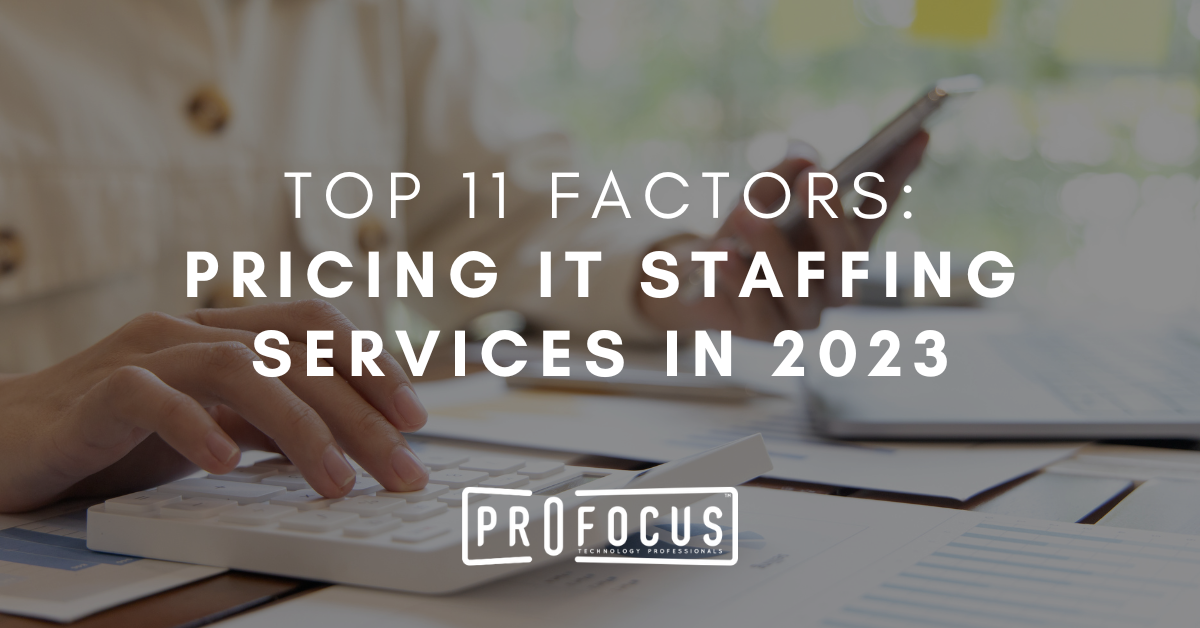Have you just been quoted an hourly bill rate from a recruiter at a tech staffing firm and you are wondering: Is this pricing fair? If you would pay $110K for a full-time hire, why do they bill you $90-$115 per hour, or even higher?
Or —
Are you a contractor or consultant and are wondering why you are getting paid less than the bill rate to the client? Is this fair?
We’re here to answer the questions that continue to pop up. How is pricing set at IT Staffing companies? What are staffing pricing models? How do they calculate pay and bill rates? What explains the difference between the bill rate and the pay rate? Are staffing agencies worth it?
How much does IT Staffing Cost?
We have heard people ask, “Why is the staffing company taking my wages?” “Why does the staffing company take such a big cut?” “What percentage does the staffing company take?”
This article explains the reasons for the pricing that IT Staffing companies charge and applies to Technology positions such as:
|
|
Tech staffing firms make an hourly margin, they do this by charging client companies a bill rate that is higher than their hourly pay rates. This is the basic business model of IT Staffing.
A lot of misunderstanding comes from people comparing the bill rate with the pay rate. Firstly, to understand is that the Tech Staffing firm’s hourly cost is higher than the actual pay rate and the difference between the bill rate and the pay rate does not equal the margin for the staffing company. See the breakdown below.
Like all other companies, tech staffing firms have a list of behind the scenes costs. IT Staffing Firms usually net about 5% of revenue which makes it a low-margin business. In comparison, banks and software companies have net margins of about 24%, drug companies 14%. The “Business and Consumer Services” category has an average net of 5%.
How DO Staffing Agencies Make Money?
Staffing companies do not take a cut from your wages.
The contractor and consultant always earn a fair market wage for the work they do. Otherwise, they would not accept the job, or would move along to bigger and brighter opportunities. Client companies buy the services at a higher price which covers the employees’ wages, the other costs of running the business, and some margin as well.
The client company pays the margin by paying added fees on top of the market wages paid to the contractor/consultant. The contractor/consultant gets a full wage, and the client company pays the service fees.
Top 11 Factors in Pricing IT Staffing Services
1. Who Earns More: Hourly IT Contractors Earn or Full Time Hires
Tech workers demand a premium for taking contract roles. They have less job security, time off, have to account for downtime between jobs, and their benefits are not as strong as full-time employees at companies.
One of the great benefits of working as a contract consultant – this role makes more money on an hourly basis than full time hires.
These are some of the many factors that increase costs for the IT Staffing firm. In the example scenario at the top of this article, the salary level for the position is $110K, which would be $55/hour if you do not consider a contract consultant premium. In this scenario, the IT Staffing company will typically pay $60-$70 per hour or more to secure top talent on a contract basis.
2. Direct Payroll Costs on Every Dollar for the IT Staffing Company
Most IT Staffing companies hire their contractors on a W-2 basis. The payroll taxes which typically runs 12-15% of the amount paid in wages. There are direct costs associated with every dollar of payroll paid and do not include overhead expenses such as payroll processing costs, most benefits costs, or payroll vendor costs.
3. Pricing of Employee Benefits
ProFocus Technology prides itself on offering high-end benefits through the premier health insurance company in our market, 401(k) with match, educational reimbursements of $1200 per year, Employee Assistance Programs, employer-paid life and disability insurance, and paid sick time off. This adds costs of another 8-10% or more of the amount paid in wages. Different IT Staffing companies have different benefits, and this is worth looking into to what works best for you.
4. Contingent Nature of Each IT Contract Placement
An IT Staffing firm will put a lot of effort into requests for an IT contractor and will invest thousands of dollars working on the opening for you. There is no guarantee that the job order won’t be canceled before the person starts as it happens all the time.
In fact, IT staffing firms fill between 5% and 30% of the job orders they work on. Generally, placement ratios depend on the types of business they are working on and who their clients are. Even positions that are never filled still require a lot of effort and the pricing model needs to cover this labor for each one that is filled.
5. Building a Highly Skilled Team of Recruiters and Account Managers
Part of the success of IT Staffing firms is that the Recruiters and Account Managers are constantly hunting for talent. Tech staffing Recruiters and Account Managers are sales professionals, doing outbound sales activities and together with these factors and having sales professionals in the technology industry, combination that is in high demand.
Similarly, Client Managers and Tech Talent want to work with high-caliber tech staffing professionals and will choose this every time over the alternative.
6. Other Team Members Involved
The experience of the candidate or a client manager is participating in some discussions about the position and then the contract engagement got started a week or two later which may give the impression that not much work has been done. In reality, there is a whole team working diligently behind the scenes. They are troubleshooting meetings if the position is difficult to fill along with managers overseeing the quality of the work just to name a few of the tasks at hand.
7. Payment for the Company’s Operations
There are many expenses for the IT Staffing company. They have rent, utilities, computer systems, software licenses, insurance, training, accounting, financing, and more. It is not all back-office costs either. Many costs are investments that directly result in the services such as recruiting-related software licenses, applicant tracking systems, advertising for candidates, hosting or sponsoring networking events, etc.
The company’s operations team keeps everything running smoothly and works on behalf of all employees. From hiring and training account managers, to structuring computer systems, developing contracts with lawyers, and everything in between. All operations teams are there to support all internal and external staff members throughout their employment.
8. The Cost of Financing for IT Staffing
An interesting aspect of IT Staffing is the financing as consultants are paid weekly while client companies take longer to pay. Generally, companies pay their bills in about 30 days, but it is also common for the IT Staffing firm to be paid 45, 60, and even 90 days later. This situation results in a large amount of cash to fund every contract consultant who is working.
Here is an example: Consultant A starts working at the beginning of the month and earns $65/hour and the Client company has requested monthly invoices.
Consultant A turns in a timecard on Monday from their previous work week and by the following Friday they are paid by the Tech Staffing company. That means that one week of pay and payroll taxes (totaling $3000) is out the door. After 1 month, 4 weeks of payroll have been paid (totaling $12,000) when the monthly invoice has been sent to the client. By the time the client pays the invoice 45 days later, an added $18,000 (6 weeks x $3000) has been paid to the consultant. That is a total of $30,000 in cash needed to finance Consultant A.
This aspect of the pricing for IT Staffing services needs to be accounted for.
9. Uncertainty in Financing
In the situation above, the $30,000 at risk of non-payment from the client is the same as making a $30,000 loan.
From this point it gets worse for the staffing company. Usually, in non-payment scenarios, it will get far beyond $30,000. Therefore if a client stops paying, the IT staffing company may not realize it immediately and some time will pass before a payment problem is flagged. This means that every consultant in the field there is a risk of losing $60,000 or more due to non-payment from a client.
The rule is that the W-2 contractor/consultant will always get paid on time, while the IT Staffing company finances these risks.
10. Guarantees for Services
IT Staffing firms usually have guarantees for their services. This is another risk of non-payment for work that the IT Staffing firm carries as regardless of what happens the W-2 contractor/consultant will always be paid.
11. Legal Risks and Insurance
There are myriad legal risks that IT Staffing firms face, just like any other business. Though quantifying them may be difficult, there is certainly a cost over time that needs to be accounted for.
Insuring an IT Staffing firm is extensive and expensive. The company purchases insurance to protect against the risks involved with being legally responsible for IT professionals inside a large corporation.
IT Staffing Pricing Models
Account managers, managers, and recruiters inside IT Staffing agencies are in charge of calculating pay rates and bill rates.
The typical spreadsheets they build will consider factors such as the client’s payment terms, the difficulty in finding the needed talent, market pay rates for the role, the length of the assignment, etc.
As a result, these models calculate the gross profit margin on an hourly basis. The staffing firm will ensure that the pay rate and the bill rate meet the staffing firm’s margin requirements.
Some firms will shortcut this process by using a markup pricing model which consists of multiplying the pay rate by a markup percentage. However, even this is not a fixed amount as additional factors are considered such as the length of the assignment and whether it is full or part-time work. It will often also depend on the pay rate of the assignment as higher pay rates having lower markups.
Additional Elements of IT Staffing
Corp-to-Corp Scenarios
Sometimes IT Staffing companies subcontract to other staffing companies, outside consulting companies, or individual consultants who have consulting businesses. In these cases, the payroll and benefits costs mentioned above do not apply. A reputable IT Staffing firm will take these savings into account when setting pricing, making a fair margin that considers the reduced costs in payroll taxes and benefits.
Here is a link to an article with more details about the differences between Corp-to-Corp, 1099, and W-2.
Stacking Service Providers
A few companies have realized they have a problem of “stacked” IT staffing vendors. This means an IT Staffing firm will find a contractor or consultant from another IT Staffing firm. Consequently, each IT Staffing company should theoretically make half the margin they normally would.
One company subcontracts to another which subcontracts to another…ending up with 2, 3, or more subcontractors, each making margin from the project. This normally ends up increasing the pricing for the client, but it can also create downward pressure on the wages paid. Reputable companies such as ProFocus Technology take strict measures to avoid stacking of any kind.
IT Consulting Firms
For companies concerned about costs, we recommend avoiding IT Staffing services (i.e., Staff Augmentation) from consulting companies as the hourly bill rates are much higher. IT Staffing has a bill rate that is tied closely to the pay rate though they are not highly dependent on one another. Most importantly, ProFocus Technology would be happy to give you some quotes so you can compare if you find yourself in this situation.
Ethics and Behaviors
Throughout each of these factors we have outlined industry-standard ethics and behaviors, certainly there will be cases that involve those who don’t hold their IT Staffing services and pricing to a high standard. Working with a reputable firm will help in avoiding these unnecessary problems.
A Look at Staffing Terminology
This article refers to Tech Staffing, Technology Staffing, and IT Staffing. Sometimes people refer to this business with different terms including employment agency, staffing agency, temp services, temporary services, temporary staffing, staff augmentation, recruiting agency, recruitment agency, contracting, consulting, employee solutions, staffing solutions, headhunters, recruitment firm, recruiters, or search firm.
- Contract IT Staffing – Companies use our contract IT staffing services to add technology professionals to their teams for a long or short-term period of time.
- Contract IT Consulting – Contract IT consulting provides consultants who bring in high levels of expertise to guide initiatives and transfer knowledge.
- Contract-to-Hire IT Staffing – ProFocus provides a contract technology professional and the client can hire after they have proven themselves on the job.
- Direct Hire IT Staffing – ProFocus provides candidates for a client’s open position. The client hires one of the candidates and pays a placement fee.
- Statement of Work (SOW) – ProFocus completes projects or manages responsibilities for a client company according to an SOW contract.
- IT Staffing for Contract Teams – A ProTeam allows the customer to own direct oversight of the organization or system being managed and ProFocus delivers the services with a highly skilled team.
- Payrolling – When a client wants to work with a professional but not hire them as a regular employee, ProFocus can provide them on a contract basis.
- Managed Services – ProFocus provides managed services to focus on specific projects or initiatives.
Integrity, Honesty, and Fairness
We hope that reviewing these factors in detail have given you an insight into the workings of an IT Staffing firm and their pricing. If you are looking for a technology staffing company that has high integrity and a commitment to honesty, which includes fair pay and fair pricing, you know where to find us and we look forward to working with you.




